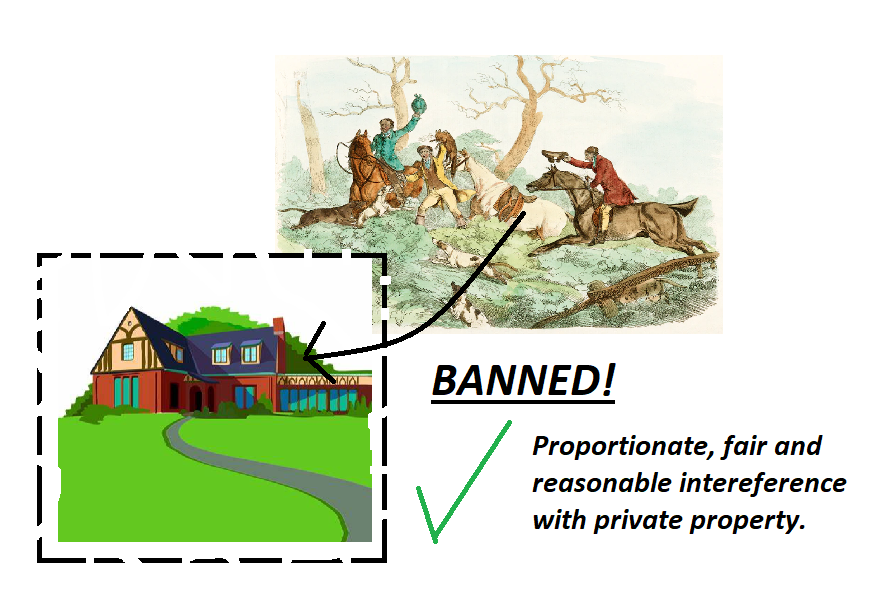Jackson v Attorney General, 2006 1 AC 262
Citation:Jackson v Attorney General, 2006 1 AC 262
Rule of thumb:Is the banning of certain types of treatment of animals on a property, such as fox-hunting, a violation of the right to private property? No, preventing cruelty to animals is a legitimate aim and this is not a human rights violation.
Background facts:
The facts of this case were that a particular form of hunting ban for sport was banned on private property.
Parties argued:
Jackson argued that he had a human right to private property and this was a disproportionate and unjustified interference with it – the animals being hunted were not in danger of being extinct etc and needed culled on the land.
Judgment:
The Court however held that due to the fear that the animals were put through before being killed this was a legitimate interference with the right to private property meaning this Act did not violate this human right. The Court further held that Parliamentary was still sovereign – Parliament could still implement a derogation from human rights before an Act was introduced. Furthermore, the Court affirmed that human rights do curb the power of Parliament and that Parliament cannot introduce statutes which are unjustifiable – the Court further affirmed that this has been the case in the UK since the 1688 Bill of Rights – albeit the human rights now are more numerous and far-reaching than they were back then, but the general category of law has been around since then. The Court did make the argument that the Parliamentary sovereignty in the UK was not absolute – it was suggested that if the Parliament ever tried to pass an Act to abolish the Court itself with the Executive/Government becoming the Judge then the Court would not apply this Act. This was a famous case due to so many powerful speeches about matter of fundamental constitutional importance in the UK by the law lords.

Ratio-decidendi:
‘The bedrock of the British constitution is, and in 1911 was, the supremacy of the Crown in Parliament... Then, as now, the Crown in Parliament was unconstrained by any entrenched or codified constitution. It could make or unmake any law it wished. Statutes, formally enacted as Acts of Parliament, properly interpreted, enjoyed the highest legal authority’, Lord Bingham, ‘If that is so, it is not unthinkable that circumstances could arise where the courts may have to qualify a principle established on a different hypothesis of constitutionalism. In exceptional circumstances involving an attempt to abolish judicial review or the ordinary role of the courts, the Appellate Committee of the House of Lords or a new Supreme Court may have to consider whether this is a constitutional fundamental which even a sovereign Parliament acting at the behest of a complaisant House of Commons cannot abolish’, Lord Steyn, ‘Parliamentary sovereignty is no longer, if it ever was, absolute ... It is no longer right to say that its freedom to legislate admits of no qualification whatever. Step by step, gradually but surely, the English principle of the absolute legislative sovereignty of Parliament ... is being qualified ... The rule of law enforced by the courts is the ultimate controlling factor on which our constitution is based. The fact that your Lordships have been willing to hear this appeal and to give judgment upon it is another indication that the courts have a part to play in defining the limits of Parliament's legislative sovereignty’, Lord Hope
Warning: This is not professional legal advice. This is not professional legal education advice. Please obtain professional guidance before embarking on any legal course of action. This is just an interpretation of a Judgment by persons of legal insight & varying levels of legal specialism, experience & expertise. Please read the Judgment yourself and form your own interpretation of it with professional assistance.

